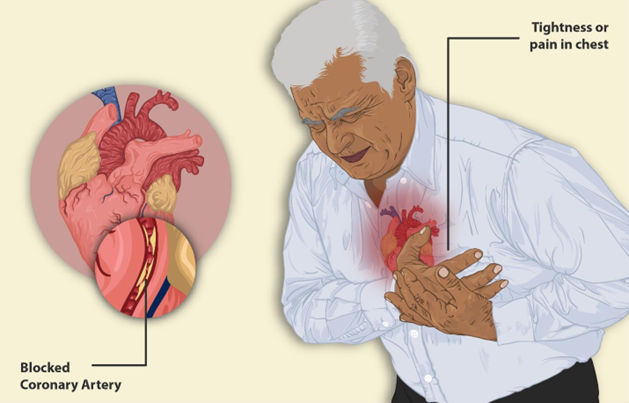The nurse is developing a plan of care for an older client with hypertension who reports chest pain on exertion. Which outcome should the nurse include in the plan of care for this client?

The nurse will call the client weekly to monitor the client's blood pressure and symptoms.
The nurse will encourage the client to walk thirty minutes every day.
The client will take up to 4 nitroglycerine tablets sublingually for chest pain.
The client will record episodes of angina and self-management for one week.
The Correct Answer is D
Choice A rationale:
Weekly monitoring of blood pressure and symptoms is important but does not address the specific issue of chest pain on exertion.
Choice B rationale:
Encouraging daily walking is generally a good recommendation for overall health but does not address the immediate concern of chest pain.
Choice C rationale:
Taking up to 4 nitroglycerine tablets for chest pain may provide temporary relief, but this should be done under the guidance of a healthcare provider and is not a long-term outcome.
Choice D rationale:
Recording episodes of angina and self-management for one week is a specific and appropriate outcome to monitor the client's chest pain and response to interventions.
Nursing Test Bank
Naxlex Comprehensive Predictor Exams
Related Questions
Correct Answer is D
Explanation
Choice A rationale:
An adult with schizophrenia who often refuses to take prescribed antipsychotic medications may require a different approach, such as medication education or supportive therapy.
Choice B rationale:
A hyperactive 4-year-old who has recently been tested for autism may benefit from play therapy or other age-appropriate interventions rather than role-playing.
Choice C rationale:
An older adult resident of a long-term care facility who sometimes takes other residents' belongings may require interventions focused on behavior management and addressing the underlying causes of this behavior.
Choice D rationale:
Role-playing can be an effective therapeutic intervention for individuals who need to practice social skills, communication, and problem-solving in a safe and controlled environment. In this case, the adolescent who is depressed over not being accepted by peers may benefit from role-playing to develop and practice social skills, assertiveness, and coping strategies for peer interactions.
Correct Answer is B
Explanation
Choice A rationale:
Cocaine is a stimulant and typically leads to increased heart rate (tachycardia) and respiratory rate (tachypnea). Bradycardia (slow heart rate) and bradypnea (slow respiratory rate) would be atypical findings with cocaine use.
Choice B rationale:
Cocaine is a stimulant drug that typically produces effects such as increased heart rate, increased blood pressure, stimulation, euphoria, and dilated pupils. These physiological and psychological effects are common when someone has used cocaine.
Choice C rationale:
While cocaine use can cause hallucinations and paranoia during intoxication or withdrawal, these symptoms are not typically the primary manifestations. The most common initial effects are stimulation and increased alertness.
Hallucinations and delusions may occur with substance use, but they are not the most expected or specific findings for cocaine use.
Choice D rationale:
Cocaine use is associated with increased energy, euphoria, and heightened arousal. Lethargy and depression are more likely during the comedown phase or withdrawal from cocaine, rather than immediately after use.
Whether you are a student looking to ace your exams or a practicing nurse seeking to enhance your expertise , our nursing education contents will empower you with the confidence and competence to make a difference in the lives of patients and become a respected leader in the healthcare field.
Visit Naxlex, invest in your future and unlock endless possibilities with our unparalleled nursing education contents today
Report Wrong Answer on the Current Question
Do you disagree with the answer? If yes, what is your expected answer? Explain.
Kindly be descriptive with the issue you are facing.
